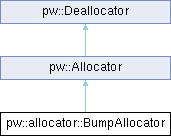Allocator that does not automatically delete.
A "bump" or "arena" allocator provides memory by simply incrementing a pointer to a memory region in order to "allocate" memory for requests, and doing nothing on deallocation. All memory is freed only when the allocator itself is destroyed. As a result, this allocator is extremely fast.
Bump allocators are useful when short-lived to allocate objects from small buffers with almost zero overhead. Since memory is not deallocated, a bump allocator with a longer lifespan than any of its allocations will end up holding unusable memory. An example of a good use case might be decoding RPC messages that may require a variable amount of space only for as long as it takes to decode a single message.
On destruction, the destructors for any objects allocated using New or MakeUnique are NOT called. To have these destructors invoked, you can allocate "owned" objects using NewOwned and MakeUniqueOwned. This adds a small amount of overhead to the allocation.
|
|
constexpr | BumpAllocator () |
| | Constructs a BumpAllocator without initializing it.
|
| |
|
| BumpAllocator (ByteSpan region) |
| | Constructs a BumpAllocator and initializes it.
|
| |
|
void | Init (ByteSpan region) |
| | Sets the memory region to be used by the allocator.
|
| |
| template<typename T , int &... kExplicitGuard, typename... Args> |
| T * | NewOwned (Args &&... args) |
| |
| template<typename T , int &... kExplicitGuard, typename... Args> |
| UniquePtr< T > | MakeUniqueOwned (Args &&... args) |
| |
| void * | Allocate (Layout layout) |
| |
| template<typename T , int &... kExplicitGuard, typename... Args> |
| std::enable_if_t<!std::is_array_v< T >, T * > | New (Args &&... args) |
| |
| template<typename T , int &... kExplicitGuard, typename ElementType = std::remove_extent_t<T>, std::enable_if_t< is_bounded_array_v< T >, int > = 0> |
| ElementType * | New () |
| |
| template<typename T , int &... kExplicitGuard, typename ElementType = std::remove_extent_t<T>, std::enable_if_t< is_unbounded_array_v< T >, int > = 0> |
| ElementType * | New (size_t count) |
| |
| template<typename T , int &... kExplicitGuard, typename ElementType = std::remove_extent_t<T>, std::enable_if_t< is_unbounded_array_v< T >, int > = 0> |
| ElementType * | New (size_t count, size_t alignment) |
| | Constructs an alignment-byte aligned array of count objects.
|
| |
| template<typename T > |
| T * | NewArray (size_t count) |
| |
| template<typename T > |
| T * | NewArray (size_t count, size_t alignment) |
| |
| template<typename T , int &... kExplicitGuard, std::enable_if_t<!std::is_array_v< T >, int > = 0, typename... Args> |
| UniquePtr< T > | MakeUnique (Args &&... args) |
| |
| template<typename T , int &... kExplicitGuard, std::enable_if_t< is_unbounded_array_v< T >, int > = 0> |
| UniquePtr< T > | MakeUnique (size_t size) |
| |
| template<typename T , int &... kExplicitGuard, std::enable_if_t< is_unbounded_array_v< T >, int > = 0> |
| UniquePtr< T > | MakeUnique (size_t size, size_t alignment) |
| |
| template<typename T , int &... kExplicitGuard, std::enable_if_t< is_bounded_array_v< T >, int > = 0> |
| UniquePtr< T > | MakeUnique () |
| |
| template<typename T > |
| UniquePtr< T[]> | MakeUniqueArray (size_t size) |
| |
| template<typename T > |
| UniquePtr< T[]> | MakeUniqueArray (size_t size, size_t alignment) |
| |
| template<typename T , int &... kExplicitGuard, std::enable_if_t<!std::is_array_v< T >, int > = 0, typename... Args> |
| SharedPtr< T > | MakeShared (Args &&... args) |
| |
| template<typename T , int &... kExplicitGuard, std::enable_if_t< is_unbounded_array_v< T >, int > = 0> |
| SharedPtr< T > | MakeShared (size_t size) |
| |
| template<typename T , int &... kExplicitGuard, std::enable_if_t< is_unbounded_array_v< T >, int > = 0> |
| SharedPtr< T > | MakeShared (size_t size, size_t alignment) |
| |
| template<typename T , int &... kExplicitGuard, std::enable_if_t< is_bounded_array_v< T >, int > = 0> |
| SharedPtr< T > | MakeShared () |
| |
| bool | Resize (void *ptr, size_t new_size) |
| |
| bool | Resize (void *ptr, Layout layout, size_t new_size) |
| |
| void * | Reallocate (void *ptr, Layout new_layout) |
| |
| void * | Reallocate (void *ptr, Layout old_layout, size_t new_size) |
| |
| size_t | GetAllocated () const |
| |
|
constexpr const Capabilities & | capabilities () const |
| |
|
bool | HasCapability (Capability capability) const |
| | Returns whether a given capability is enabled for this object.
|
| |
| void | Deallocate (void *ptr) |
| |
| void | Deallocate (void *ptr, Layout layout) |
| |
| template<typename ElementType > |
| void | DeleteArray (ElementType *ptr, size_t count) |
| |
| StatusWithSize | GetCapacity () const |
| |
| bool | IsEqual (const Deallocator &other) const |
| |
| template<typename T , int &... kExplicitGuard, std::enable_if_t<!std::is_array_v< T >, int > = 0> |
| void | Delete (T *ptr) |
| |
|
template<typename T , int &... kExplicitGuard, typename ElementType = std::remove_extent_t<T>, std::enable_if_t< is_bounded_array_v< T >, int > = 0> |
| void | Delete (ElementType *ptr) |
| |
|
template<typename T , int &... kExplicitGuard, typename ElementType = std::remove_extent_t<T>, std::enable_if_t< is_unbounded_array_v< T >, int > = 0> |
| void | Delete (ElementType *ptr, size_t count) |
| |

 Public Member Functions inherited from pw::Allocator
Public Member Functions inherited from pw::Allocator Public Member Functions inherited from pw::Deallocator
Public Member Functions inherited from pw::Deallocator Public Types inherited from pw::Deallocator
Public Types inherited from pw::Deallocator Protected Member Functions inherited from pw::Allocator
Protected Member Functions inherited from pw::Allocator Protected Member Functions inherited from pw::Deallocator
Protected Member Functions inherited from pw::Deallocator Static Protected Attributes inherited from pw::Deallocator
Static Protected Attributes inherited from pw::Deallocator